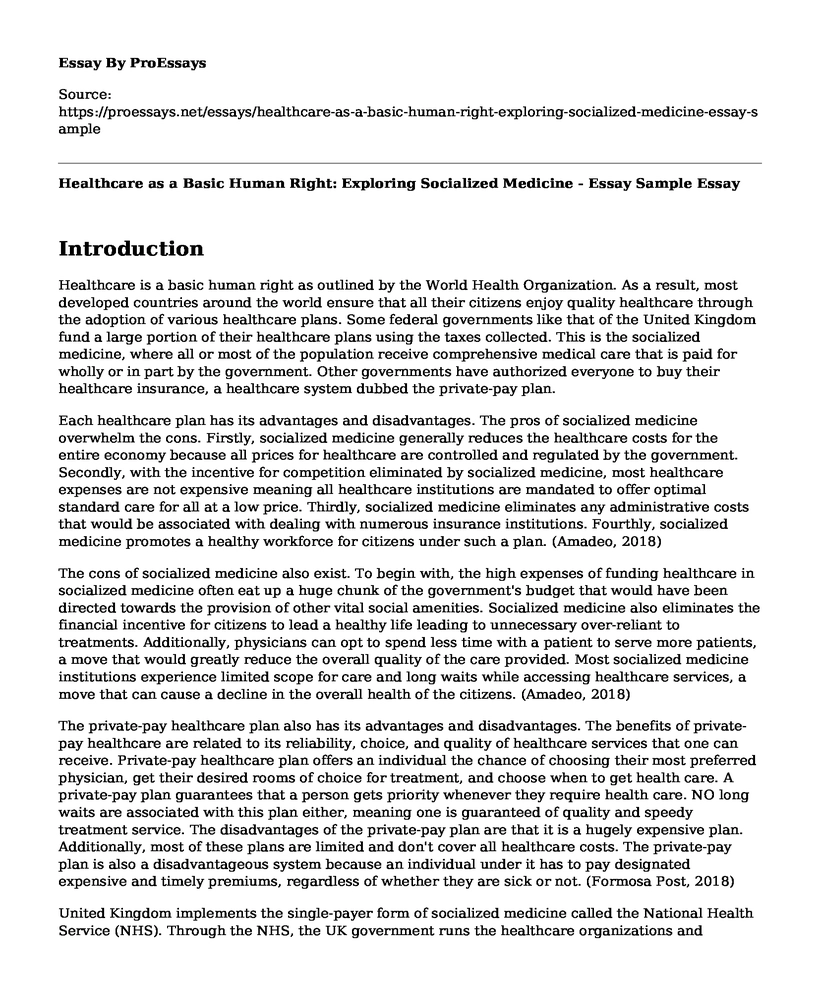Introduction
Healthcare is a basic human right as outlined by the World Health Organization. As a result, most developed countries around the world ensure that all their citizens enjoy quality healthcare through the adoption of various healthcare plans. Some federal governments like that of the United Kingdom fund a large portion of their healthcare plans using the taxes collected. This is the socialized medicine, where all or most of the population receive comprehensive medical care that is paid for wholly or in part by the government. Other governments have authorized everyone to buy their healthcare insurance, a healthcare system dubbed the private-pay plan.
Each healthcare plan has its advantages and disadvantages. The pros of socialized medicine overwhelm the cons. Firstly, socialized medicine generally reduces the healthcare costs for the entire economy because all prices for healthcare are controlled and regulated by the government. Secondly, with the incentive for competition eliminated by socialized medicine, most healthcare expenses are not expensive meaning all healthcare institutions are mandated to offer optimal standard care for all at a low price. Thirdly, socialized medicine eliminates any administrative costs that would be associated with dealing with numerous insurance institutions. Fourthly, socialized medicine promotes a healthy workforce for citizens under such a plan. (Amadeo, 2018)
The cons of socialized medicine also exist. To begin with, the high expenses of funding healthcare in socialized medicine often eat up a huge chunk of the government's budget that would have been directed towards the provision of other vital social amenities. Socialized medicine also eliminates the financial incentive for citizens to lead a healthy life leading to unnecessary over-reliant to treatments. Additionally, physicians can opt to spend less time with a patient to serve more patients, a move that would greatly reduce the overall quality of the care provided. Most socialized medicine institutions experience limited scope for care and long waits while accessing healthcare services, a move that can cause a decline in the overall health of the citizens. (Amadeo, 2018)
The private-pay healthcare plan also has its advantages and disadvantages. The benefits of private-pay healthcare are related to its reliability, choice, and quality of healthcare services that one can receive. Private-pay healthcare plan offers an individual the chance of choosing their most preferred physician, get their desired rooms of choice for treatment, and choose when to get health care. A private-pay plan guarantees that a person gets priority whenever they require health care. NO long waits are associated with this plan either, meaning one is guaranteed of quality and speedy treatment service. The disadvantages of the private-pay plan are that it is a hugely expensive plan. Additionally, most of these plans are limited and don't cover all healthcare costs. The private-pay plan is also a disadvantageous system because an individual under it has to pay designated expensive and timely premiums, regardless of whether they are sick or not. (Formosa Post, 2018)
United Kingdom implements the single-payer form of socialized medicine called the National Health Service (NHS). Through the NHS, the UK government runs the healthcare organizations and employs all healthcare professionals. The NHS program is 80% funded by the government via the taxes it collects. All the residents of the UK receive free medical care for all health issues like dental, eye care, hospice care, and some long term illnesses. Visitors can enjoy the NHS program where they receive medical attention for infectious diseases or whenever they require emergency attention. (Amadeo, 2018)
The healthcare plan implemented in the US is a combination of both the private pay model and a government-run plan. Healthcare services in the US are provided by private institutions. Most of the healthcare expenses are covered by the government while the others are covered through private means. Most Americans are insured via their employers, while others receive insurance subsidies through Obamacare, Medicaid, and Medicare. Other Americans are uninsured (Amadeo, 2018). The United States spends more of its budget on health care expenditure as compared to the UK. The privatized medical system of the US tends to shorten the waiting time for patients seeking medical services as compared to those in the United Kingdom.
References
Amadeo, K. (2018, January 5). Why America is the only rich country without universal health care. Retrieved November 29, 2019, from https://www.thebalance.com/universal-health-care-4156211
Formosa Post. (2018, January 30). Pros and cons of private health care. Retrieved November 29, 2019, from https://www.formosapost.com/pros-and-cons-of-private-health-care/
Cite this page
Healthcare as a Basic Human Right: Exploring Socialized Medicine - Essay Sample. (2023, Mar 09). Retrieved from https://proessays.net/essays/healthcare-as-a-basic-human-right-exploring-socialized-medicine-essay-sample
If you are the original author of this essay and no longer wish to have it published on the ProEssays website, please click below to request its removal:
- Paper Example on Silent Myocardial Infarction
- Four Ethical Models of a Physician-Patient Relationship Essay
- Essay Example on Gender-Based Violence: A Global Menace to Social, Health Wellbeing
- Essay Sample on Costa Rica & US Health Care: A Comparative Analysis
- Essay on Addressing Social Factors Affecting Population Health: The Need for Policy Advocacy
- Covid-19 Crisis: Christians Call to Unite in Trust of Holy Spirit - Essay Sample
- Essay Sample on Ageing: Preparing for Physical Challenges & Modifying Lifestyle







